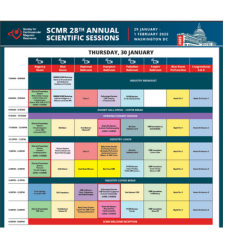Oral Abstract
BRITISH, an ongoing randomized trial of implantable defibrillators for non-ischemic cardiomyopathy with severe LV impairment and myocardial scar: trial design and update.
- AF
Andrew Flett, MD, BSc
Consultant Cardiologist
University Hospital Southampton, United Kingdom - AF
Andrew Flett, MD, BSc
Consultant Cardiologist
University Hospital Southampton, United Kingdom - AC
Anna Cebula, N/A
Trial manager
University of Southampton, United Kingdom - ZN
Zoe Nicholas, N/A
Trial manager
University Hospital Southampton, United Kingdom - RA
Robert Adam, MD, BSc
Consultant Cardiologist
University Hospital Southampton, United Kingdom - SE
Sean Ewings, PhD
Statistician
University of Southampton, United Kingdom - SP
Sanjay Prasad, MD, PhD
Professor in Cardiac Medicine
Royal Brompton & Harefield NHS Foundation Trust, United Kingdom - ZE
Zina Eminton, N/A
Trial Project Manager
University of Southampton, United Kingdom - CL
Clothier Liam, N/A
Statistician
University of Southampton, United Kingdom - JC
John Cleland
Professor
Imperial College London, United Kingdom - NC
Nick Curzen, PhD
Professor of Cardiology
University of Southampton, United Kingdom
Presenting Author(s)
Primary Author(s)
Co-Author(s)
Patients with non-ischemic cardiomyopathy (NICM) are at increased risk of ventricular tachyarrhythmia (VT/VF) leading to sudden death. Implantable cardioverter defibrillators (ICD) are an effective treatment VT/VF but this does not necessarily translate into a reduction in all-cause mortality, which has led to downgrading of the strength of recommendation to IIa for NICM in international guidelines. Most patients with NICM receiving ICDs never receive appropriate ICD therapy but remain prone to the risks of the device. There is a substantial evidence that non-ischaemic scar on cardiac MRI is associated with adverse prognosis and, specifically, an increase in risk of ventricular arrythmias and sudden death. Non-ischaemic scar could be a useful marker for patients who might benefit from an ICD. BRITISH addresses this evidence-gap by asking the question: “does implanting an ICD in patients with NICM and scar reduce all-cause mortality?”. The study is funded by the British Heart Foundation.
Methods:
The BRITISH trial is a UK multicentre randomised trial and registry. Patients with NICM, severe LV impairment (EF < 36%) and myocardial scar are being randomised to ICD versus an implantable loop recorder (ILR) unless indicated for cardiac resynchronisation therapy in which case they are randomised to CRTD versus /CRTP. The primary endpoint is all cause mortality at 3 years but there will be a long-term extension phase. Similar patients without scar are being enrolled in a registry. Rates of ICD implantation, VT/VF and sudden death will be reported. All patients will have blood stored for later proteomic and genetic analyses and their baseline CMR uploaded to a corelab (MycardiumAI).
Results: As of November 2024, 41 UK sites are open with a plan to open 9 more. Mean recruitment rate is 0.6 patients per site/month. 264 patients have been randomised with a median (IQR) age of 67 (58-74) years, 212 (80%) are men and most (62%) were in sinus rhythm. Median (IQR) for NT-proBNP was 624 (330-1394), for eGFR was 64 (55-78) mL/min/1.73m2 and for left ventricular ejection fraction was 30 (24-33)% with range of 6-35%. By CMR the first 88 patients have been analysed and the median (IQR) for EF was 28 (22 to 33) and scar %/mass median (IQR) was 6%(4%). CMR analysis will be updated with complete dataset prior to presentation. Device implants have occurred in 184 patients so far, with 26% receiving ICD and 24% CRTD compared to 24% receiving ILR and 25% CRT-P.
Conclusion: The BRITISH study has now passed its vanguard phase with full funding to complete and will continue recruiting for an estimated 2.5 years with a further 3 years follow-up and estimated reporting of findings in May 2030. It will answer the question of whether CMR identified scar can be used to guide patient selection for ICD to reduce all-cause mortality and will inform international guideline committees. Further analysis of the baseline bloods and CMR may highlight novel markers which predict ICD benefit.

